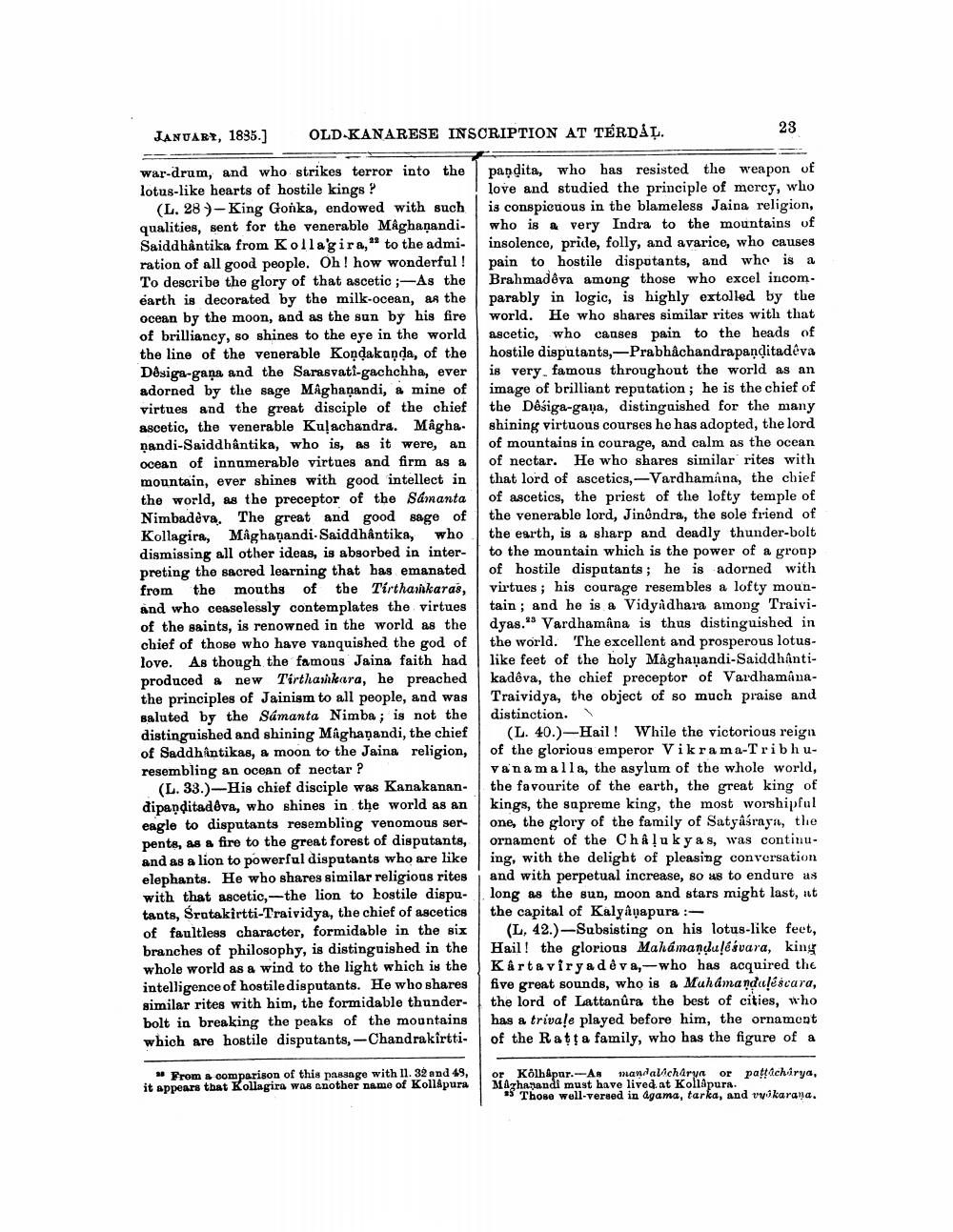________________
23
JANUARY, 1835.]
OLD-KANARESE INSCRIPTION AT TERDÅ!.
war-drum, and who strikes terror into the lotus-like hearts of hostile kings?
(L. 28 )-King Gonka, endowed with such qualities, sent for the venerable MaghanandiSaiddhantika from Kollagira," to the admi. ration of all good people. Oh! how wonderful ! To describe the glory of that ascetic ;-As the earth is decorated by the milk-ocean, as the ocean by the moon, and as the sun by his fire of brilliancy, so shines to the eye in the world the line of the venerable Kondakanda, of the Dåsiga-gana and the Sarasvati-gachchha, ever adorned by the sage Maghanandi, a mine of virtues and the great disciple of the chief ascetio, the venerable Kulachandra. Mâghanandi-Saiddhậntika, who is, as it were, an ocean of innumerable virtues and firm as & mountain, ever shines with good intellect in the world, as the preceptor of the Samanta Nimbadeva. The great and good sage of Kollagira, Maghatandi. Saiddhantika, who dismissing all other ideas, is absorbed in interpreting the sacred learning that has emanated from the mouths of the Tirtharnkaras, and who ceaselessly contemplates the virtues of the saints, is renowned in the world as the chief of those who have vanquished the god of love. As though the famous Jaina faith had produced a new Tirtharikara, he preached the principles of Jainism to all people, and was Baluted by the Samanta Nimba; is not the distinguished and shining Maghanandi, the chief of Saddhantikas, a moon to the Jaina religion, resembling an ocean of nectar?
(L. 33.)-His chief disciple was Kanakanandipanditadêva, who shines in the world as an eagle to disputants resembling venomous ser- pents, as a fire to the great forest of disputants, and as a lion to powerful disputants who are like elephants. He who shares similar religious rites with that ascetic,--the lion to hostile dispu- tants, Srotakirtti-Traividya, the chief of ascetics of faultless character, formidable in the six branches of philosophy, is distinguished in the whole world as a wind to the light which is the intelligence of hostile disputants. He who shares similar rites with him, the formidable thunderbolt in breaking the peaks of the mountains which are hostile disputants, -Chandrakirtti
pandita, who has resisted the weapon of love and studied the principle of mercy, who is conspicuous in the blameless Jaina religion, who is a very Indra to the mountains of insolence, pride, folly, and avarice, who causes pain to hostile disputants, and who is a Brahmadêya among those who excel incom. parably in logic, is highly extolled by the world. He who shares similar rites with that ascetic, who causes pain to the heads of hostile disputants,-Prabhachandrapanditadeva is very famous throughout the world as an image of brilliant reputation; he is the chief of the Désiga-gana, distinguished for the many shining virtuous courses he has adopted, the lord of mountains in courage, and calm as the ocean of nectar. He who shares similar rites with that lord of ascetics,- Vardhamana, the chief of ascetics, the priest of the lofty temple of the venerable lord, Jinûndra, the sole friend of the earth, is a sharp and deadly thunder-bolt to the mountain which is the power of a group of hostile disputants; he is adorned with virtues; his courage resembles a lofty mountain ; and he is a Vidyadhara among Traividyas.'' Vardhamana is thus distinguished in the world. The excellent and prosperous lotuslike feet of the holy Maghanandi-Saiddhậntikadêva, the chief preceptor of VardhamanaTraividya, the object of so much praise and distinction.
(L. 40.)-Hail! While the victorious reign of the glorious emperor Vikrama-TribhuVanamalla, the asylum of the whole world, the favourite of the earth, the great king of kings, the supreme king, the most worshipful one, the glory of the family of Satyaśraya, the ornament of the Chalu ky as, was continuing, with the delight of pleasing conversation and with perpetual increase, so as to endure as long as the sun, moon and stars might last, ut the capital of Kalyanapura :
(L, 42.)-Subsisting on his lotus-like feet, Hail! the glorious Mahámandulésvara, king Kartaviryad êva,-who has acquired the five great sounds, who is a Muhamandalescara, the lord of Lattanûra the best of cities, who has a trivale played before him, the ornament of the Ratta family, who has the figure of a
From a comparison of this passage with 11. 32 and 49, it appears that Kollagira was another name of Kollapura
or Kolhapur.--As mandalacharya or pattacharya, Maghazandi must have lived, at Kollapura.
15 Those well-versed in agama, tarka, and vvikarana.




